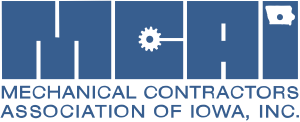Significant Laws Lobbied
Decisions made by the United States Congress and the Iowa Legislature have proven to have a profound impact on how we conduct business and how we perform in the marketplace. We are fortunate we can play a role in how these decisions are made by helping elect officials who understand our business concerns and interests.
State Law or Regulation
Establishment of the Boiler and Pressure Vessel Board
Prior to this law passed in 2004, MCAI members encountered disparity in the enforcement of boiler installation, repair and inspection regulations with little recourse for appeal. The MCAI and other interested parties drafted legislation creating a civilian board responsible for overseeing the consistent application of regulations by the State Boiler Inspector and the fair review of appeals. Visit the Iowa Boiler and Pressure Vessel Board website for additional information.
Retainage Reform
Abuse of retainage payments to contractors for completed work is pervasive in both the private and public sector. Contractors are routinely subjected to delinquent reimbursement of retainage withheld from their payment schedule, even though their scope of work has been completed. In order to curtail this abuse by some public owners, MCAI and others passed retainage reform and competitive bid threshold legislation in 2006. This legislation defines the circumstances under which all or partial retainage must be released by the owner and/or prime contractor. It also increases the threshold on public projects (except Regent’s projects) under with competitive bids are required. See the exhibits below for a quick summary.
Statewide Licensing
In 2007 the MCAI and others successfully passed a statewide licensing law for the plumbing and mechanical industry. Prior to this law, workers possessed numerous licenses for each community in which they worked rather than have one license recognized by all communities. For example, in the Des Moines area a person could have at least 12 different licenses in order to work in surrounding communities. The overall goal of the law is to enable a tradesperson to have portability throughout the entire state, as well as any states that offer licensing reciprocity. The law is also designed to provide a measure of safety to Iowa’s citizens by establishing basic minimum standards for competency, as well as continuing education. Visit the Iowa Plumbing and Mechanical Systems Licensing Board’s website to learn more.
Indemnification Reform
The practice of requiring parties in a construction contract to indemnify others for actions that are beyond their reasonable control is called “broad form” indemnification. To prevent this, MCAI and other organizations successfully lobbied in 2011 to have this form of indemnification prohibited in private and public construction contracts in Iowa. View a copy of the signed law.
Drug Testing Reform
In 2007 MCAI drafted and passed legislation amending Iowa’s drug testing statute. Prior to this change, if an employer wanted to conduct random drug testing, all employees must be entered into the testing pool. Therefore, contractors signatory to collective bargaining agreements with multiple crafts were often prevented from conducting random testing because one craft may not allow random testing. The new law passed by MCAI makes an exception for employers with collective bargaining agreements that prohibit random testing by allowing them to still randomly test their remaining workforce.
Federal Law or Regulation
FASB Interpretation Change
In 2011 the Financial Accounting Standards Board (FASB) planned to enact new disclosures that required companies to list unfunded liabilities to defined benefit pension plans, as well as Health & Welfare insurance obligations to retirees, on their balance sheet as liabilities. Doing so would have negatively impacted bonding capacity and the ability to secure loans, thus placing signatory contractors at a disadvantage as compared to non-signatory contractors that typically don’t have defined benefit pension plans or self-funded Health & Welfare plans. The MCA of America (MCAA) petitioned and convinced FASB to rescind their original disclosure rule in lieu of a final signatory employer pension plan disclosure rule that removes these detrimental aspects. MCA of America has published a detailed informational paper with answers to frequently asked questions, as well as guidance for your accounts.
3% Withholding Law Repealed
Ending a 5-year effort by the MCAA, MCAI and other organizations, Congress repealed the 3% withholding tax on November 16, 2011. If the tax had taken effect, it would have required all federal, state and many local governments to withhold 3% from every payment to prime contractors (and perhaps their subcontractors) as a way to ensure "tax compliance." From the beginning, MCAA and MCAI argued that there are ways for the government to ensure tax compliance without penalizing the very businesses who are already tax compliant. MCAA, with the help of several contractor and local association members, worked tirelessly to first delay the tax's implementation and then to convince legislative leaders in both Congressional chambers that the tax was punitive, unfair and would cost far more to administer than it would earn in revenues. The MCAI received special recognition from the MCAA for meeting with Senator Charles Grassley (R-IA) on several occasions and convincing him to reexamine the issue that he first introduced.
Services
MCAI Membership
Become an MCAI member today and be part of the mechanical contracting industry’s premier association.
